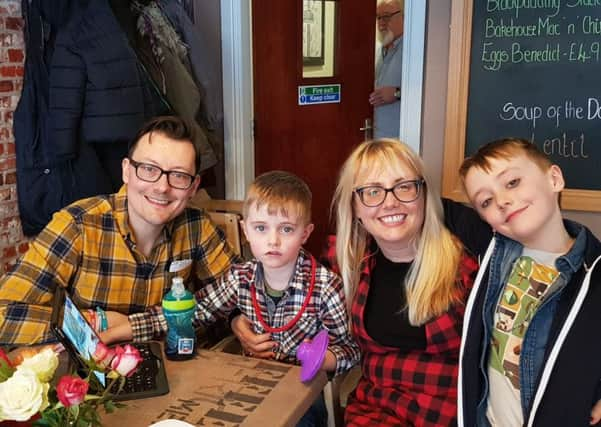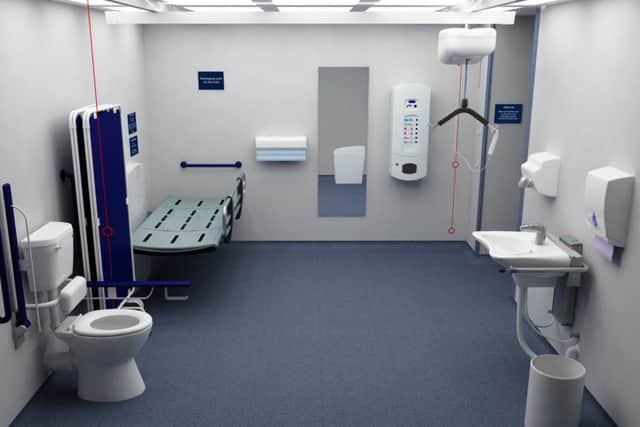Campaign for Changing Places facilities in Falkirk


Kris Procek welcomed the news that Falkirk’s constituency MSPs and MPs are teaming up to address the need by writing to a host of organisations that run venues and attractions across the Falkirk area encouraging them to install a ‘Changing Places’ toilet.
Unlike ordinary disabled toilets, these have extra room for up to two carers and a wheelchair, a hoist and tracking system and an adult changing bench.
Advertisement
Hide AdAdvertisement
Hide AdMPs John McNally and Martyn Day, along with Michael Matheson and Angus MacDonald, have offered to work with organisations in a bid to encourage more installations.


Potential sites that they have identified for Changing Places toilets include Falkirk Stadium, the Falkirk Wheel, the Kelpies and the Helix, Bo’ness and Kinneil Railway, Callander Park, Dollar Park and Cineworld.
Kris, who lives in Bonnybridge with wife Karen, has two sons, Logan (8) and Rory (6). His youngest was born with a chromosome disorder and has hyper-mobility issues which at times necessitates the use of a wheelchair.
He said: “As a family we are not looking for special treatment, but we are looking for equitable treatment.
Advertisement
Hide AdAdvertisement
Hide Ad“My wife already suffers from a bad back from having to change and lift Rory off toilet floors and out of the boot of the car.
“But Logan suffers as well because we often have to curtail family events because we need to go home to change Rory.
“A Changing Places toilet would make such a difference to the entire family.”
There are currently no Changing Places toilets in the Falkirk Council area. However, Falkirk Community Trust is waiting for the finishing touches to be put to one in its refurbished Mariner Centre, with another planned for Grangemouth Sports Complex.
Advertisement
Hide AdAdvertisement
Hide AdKris added: “Falkirk prides itself on being a tourist destination but doesn’t fulfil the basic needs for a disabled child or adult. It’s all about allowing everyone respect and dignity.”
The SNP politicians have also written to NHS Forth Valley about potential facilities at Forth Valley Royal Hospital in Larbert and Falkirk Community Hospital. And they have been in contact with Callendar Square shopping centre, which is already looking into fit a Changing Places toilet.
They have all been working with affected constituents and representatives from Scottish charity PAMIS (Promoting A More Inclusive Society) but are now joining forces to raise awareness of the issue among local businesses.
In their letter, they highlight how a lack of suitable facilities is preventing many people from attending events and visiting.
Advertisement
Hide AdAdvertisement
Hide AdThey said: “Although there are suitable facilities provided throughout Scotland for young children to be ‘changed’, once a disabled child reaches a certain age, height and weight, these facilities are no longer suitable.
“Parents find that they require to change their child on unhygienic toilet floors, on the ground outside in full view of passers-by, to return home without finishing their day’s outing, or, as many families do, not actually attend an event or shopping trip as a complete family.
“However, this issue does not only affect families with growing children, it also affects adults with complex needs.”
The MSPs and MPs conclude that providing “a respectful and welcoming facility” to locals and visitors can also benefit venues, by encouraging attendance from those who would otherwise opt to remain at home.
Advertisement
Hide AdAdvertisement
Hide AdIn recent weeks, Scottish Government minister Kevin Stewart announced plans to introduce Changing Places toilets in certain new buildings, such as large shopping centres, hospitals, schools, leisure centres and large stadia and arenas, through building regulations.
The Changing Places Consortium launched its campaign in 2006 on behalf of over 250,000 people who cannot use standard toilets, including those with profound and multiple learning disabilities, motor neurone disease, multiple sclerosis and cerebral palsy.